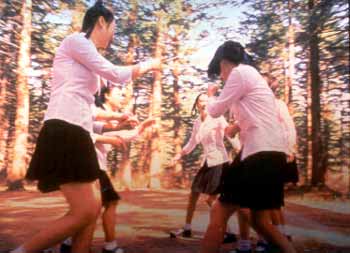Two exhibitions
dal 13/12/2002 al 2/3/2003
Segnalato da
13/12/2002
Two exhibitions
The Power Plant, Toronto
Internationally acclaimed Korean artist Lee Bul will present a newly commissioned project consisting of three futuristic self-enclosed karaoke capsules and a trilogy of videos. 'Art of the Great Proletarian Cultural Revolution': Cultural Revolution is a timely and innovative re-framing of the cultural and esthetic aspects of an infamous revolution.

Lee Bul: Live Forever
Internationally acclaimed Korean artist Lee Bul will present a newly commissioned project consisting of three futuristic self-enclosed karaoke capsules and a trilogy of videos. Through Live Forever, the artist investigates the social implications of the phenomena of karaoke, a distinctive part of contemporary culture in urban Asia,
and investigates the collective memory constructed around pop songs and the experience of the body in a technologically mediated culture.
The works in Lee Bul:
Live Forever were created by the artist in collaboration with The Fabric Workshop and Museum, Philadelphia and the San Francisco Art Institute. Support was
provided by the Korea Foundation, the National Endowment for the Arts, the E. Rhodes and Leona B. Carpenter Foundation, and Mr. and Mrs. James E. Douglas, Jr.
Image:
Lee Bul, Still From Amateurs, 2001. Video on DVD. Produced in collaboration with The Fabric Workshop and Museum, Philadelphia and the San Francisco Art Institute.
Edition of 4. Image courtesy of the artist and the San Francisco Art Institute.
____________
Art of the Great Proletarian Cultural Revolution
A touring exhibition co-curated by Scott Watson, Director of the Morris and Helen Belkin Gallery, Vancouver; with Zheng Sheng Tian, independent scholar and
artist, Delta, BC; and Yan Shan Chen, Senior Researcher of Art at the Shenzhen Art Academy, Shenzhen, People's Republic of China, Art of the Great Proletarian
Cultural Revolution is a timely and innovative re-framing of the cultural and esthetic aspects of an infamous revolution. The exhibition of more than 150 items features
the propaganda arts of this movement and rare materials such as oil paintings, wood-block prints, silkscreens, drawings, mass-produced posters and newspaper
cartoons.
The exhibition is based on the politically motivated campaign that profoundly affected all aspects of Chinese life and society, not just for the ten years (1966-76) it
took place but to the present, and is the formative life experience for a generation of Chinese writers and artists. A life-size reproduction of the destroyed sculpture,
Red Guard Praise (1967) has been re-created for the exhibition, and works will be borrowed from private collections, many never before exhibited outside China.
Catalogue available.
The Power Plant
231 Queens Quay West
Toronto, Ontario,
Canada M5J 2G8



